China Insight
China’s Crackdown on Tutoring Schools: Concerned Parents and Teachers on Weibo
The unprecedented crackdown on China’s private education has generated many online discussions.
Published
3 years agoon

Regulatory reforms in China’s private education sector have triggered concerns among parents and teachers on what the changes will mean for them and their children.
The rumors on China implementing new regulations for private tutoring were already circulating for a long time, with official media reporting on a toughening of rules for off-campus training since March of this year.
The rule changes finally became a reality when Chinese regulators announced new reforms on July 24 that will radically alter how private firms teaching school curriculum will operate.
The new guidelines are also called the ‘Double Reduction’ (双减) rules for targeting “excessive homework” and off-campus tutoring for students in the mandatory nine-year education system.
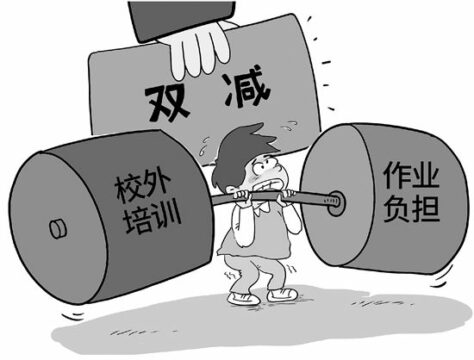
The “double reduction” policy in a cartoon published by Chinese media: the student is holding up a heavy weight of off-campus tutoring and homework. (Source: NetEase).
Most importantly, the new regulations impose stricter regulations on existing private education institutions and force them to register as non-profit organizations. Any foreign investment in the sector will be banned.
The rules specifically apply to those private institutions offering tutoring on the school curriculum. New tutoring companies will no longer be able to get a license. It will also no longer be allowed for tutoring firms to provide after-school tutoring during weekends, public holidays, and school holidays.
Beijing, Shanghai, Shenyang, Guangzhou, Chengdu, Zhengzhou, Changzhi, Weihai and Nantong are selected as national pilot cities to implement the latest guidelines.
CHINA’S BOOMING TUTORING INDUSTRY
“If you come, we’ll educate your kid, if you don’t, we’ll educate the competitors of your kid”
When talking about education in China, one of the first things that often comes to mind is the culture of fierce competition, rankings, scores, and exams. The highly competitive nature of the gaokao (高考), the National College Entrance Examinations, has fuelled a private tutoring boom.
Companies offering off-campus training often provide very specific guidance to help students grasp the study materials taught at school. They help children with homework, and will generally work through all the subjects until they are completely prepared to take their exams.
Over the past decade, China has seen a surge in the number of private tutoring agencies. Due to the pandemic, that number saw a sharp rise in 2020. According to market research platform Qianzhan, there were approximately 340,000 more education-related enterprises in China in 2020 compared to the year before.
The market is enormous – there are nearly 200 million students in China’s K12 age group, and about 75% of them attend, or have attended, after-school tutoring classes.
One of the reasons that is mentioned in Chinese media for the crackdown on after-school tutoring is that educational companies were putting profits above anything else, and were feeding off parents’ anxiety while increasing the pressure on children to drive their business.
Most Chinese parents are willing to invest a large amount of money in their children’s education, as they generally fear that their children will be left behind if they don’t. The ubiquitous advertising of after-school tutoring agencies and their cunning marketing strategies have also exacerbated parents’ anxiety about their children’s future.

https://new.qq.com/omn/20201203/20201203A0EGL700.html
A telling and well-known example is that of a private tutoring school putting up a sign saying: “If you come to us, we’ll educate your child. If you don’t come to us, we’ll educate your child’s competitors” (“您来,我们培养您孩子;您不来,我们培养您孩子的竞争对手”).
Earlier this year, Chinese TV drama A Love for Dilemma (小舍得) reignited an ongoing debate about the problem of the extreme competitive education climate in Chinese society today. That problem is also referred to as ‘involution,’ where China’s ever-growing middle class is now facing the question of how they and their children can remain in the middle class in a situation where everyone is continuously working harder and doing all they can to rise above the rest.
MORE OR LESS WORRIES FOR PARENTS?
“This is not alleviating the burden on parents, this is forcing parents on a road of despair”
There are many people and experts in China who argue that the implementation of the ‘Double Reduction’ policy will solve existing problems in the tutoring industry and help alleviate the financial pressures on parents who feel they need to send their children to off-campus training schools.
But there are also those who say that China’s crackdown on tutoring leaves parents facing new problems. Some worry that the new policy will further increase educational inequality because richer families can always find ways to let their children have off-campus tutoring, while families with heavier financial burdens have no alternative options.
“Without extracurricular training, children can only rely on one-on-one tutoring in the future. It will be even more unaffordable. This is not alleviating the burden on parents, this is forcing parents on a road of despair,” one worried commenter wrote.
Another Weibo user published the following post:
“All of the bigger and smaller online influencers are talking about how it is right that off-campus training is canceled and they support it, but isn’t it true that you are knowledgeable and experienced enough to tutor your own kids or that you have wonderful public school resources? Before you write down your opinions, have you considered that there are parents out there in the remote towns and villages who haven’t attended middle and high school, and who are raising their whole family in the hope that their children will be able to test their way out of these sad towns? Have you ever considered that the English teacher in some cities’ public schools are art graduates retrained to teach literature, language, and math at the same time, and have to manage classes of 50 children? The children of these ordinary families (..), they do not have good public school resources, and all hopes are pinned on their extra-curricular tutoring as a small step forward. Have you ever thought about that? Perhaps you will argue that only the state can guarantee fairness for the majority, but eventually, there is social stratification. Perhaps you will also say that children know how to study themselves, it’s stronger than anything, and that they will practically eat their way through the study material, and that it won’t be a problem for them to do the exam and get into a notable university. But don’t you know that without good public school resources, children don’t even have a direction for their studies? Their parents are at a loss because they are exhausted from working from 9 to 9, seven days per week.“
Higher education is greatly valued in China, as it is often perceived as the key to future opportunities and climbing the social ladder. Many Chinese families believe in “winning at the starting line” and in the idea of “ten years of study to secure an entry key to a good university.”
There is a popular term in China – ‘jiwa‘ (鸡娃), literally ‘chicken babies’, which refers to the phenomenon that today’s middle-class parents in Chinese cities tend to arrange all kinds of training courses for their children so that they have a competitive edge over other children.
However, the reality is not just about hard work and being good students; many families believe that their children have to be the best, or at least, be able to stand out from the crowd.
The admission rate of normal high schools in China is only 50%, which means that most students will have to choose between two paths in the future: one is to go to university and the other is to go to a vocational school, which is seen as less prestigious. This is a cause of anxiety for countless Chinese parents. A lot of people say that even if the extracurricular class is banned, the hyper-competitive environment is not going to change in the foreseeable future.
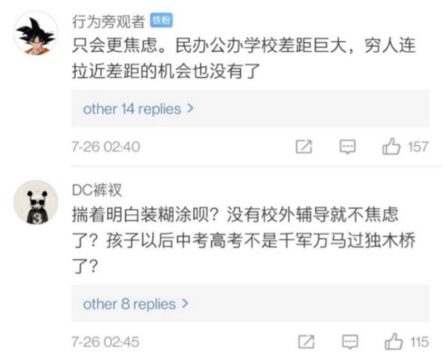
One Weibo user commented: “We are likely to be [even] more anxious. The difference between private schools and public schools is huge, and now people who are poor don’t even have a chance to catch up.” Another user added: “Are you pretending not to know the reality? Are you saying that we won’t have off-campus tutoring now and we’re all going to be less anxious? Won’t our kids still face a fiercely competitive struggle for the gaokao?”
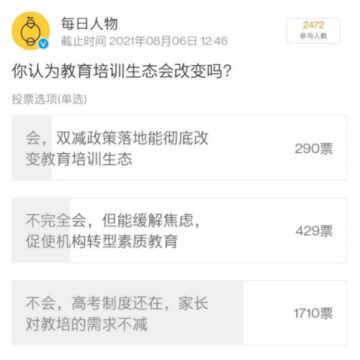
One online survey conducted by a Weibo account posed the question ‘Do you think the nature of educational institutions can be changed?’ The response shows that more than half of the participants voted ‘no, because of the gaokao system, parents’ needs for educational training won’t be affected.’ Less than one-eighth of respondents thinks the situation will actually change.
TEACHERS AND THEIR WORKLOAD
“We need to let teachers catch their breath”
Since China’s new education policy emphasizes the responsibilities of regular schools, there are also those who worry about the increased pressure on teachers, of whom many have already voiced concerns about the excessive workloads and unrealistic expectations of parents.
Chinese state media outlet Xinhua reported that, to fill the gap of the private tutoring schools, all compulsory education institutions in China will provide their students with after-school services starting fall semester 2021.
“I have a relative who is a teacher,” one social media user writes: “I know she has to work even during the break. She has to actively participate in social work. She needs to be in school at 7am, and after she gets back from school, she needs to reply to all the parents’ messages until 9pm. She also has to do online and face-to-face training, and to plan lessons and prepare homework.”
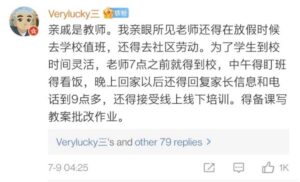

“Now, everyone is focused on reducing the workload of students, [but] we also need to let the teachers catch their breath. They deserve a better life, and the overall education quality can only be really improved if they have more energy for their everyday teaching,” one commenter said.
But it is not just the teachers at the regular schools who are seeing increased pressure. Many teachers who work at private education facilities are facing grim perspectives. In light of the new regulations, companies laid off hundreds of employees and shut down after-school tutoring schools in order to comply.
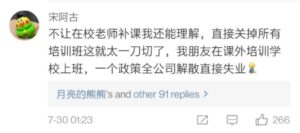
“My friend worked at one of the after-school training institutions. The whole company shut down after the new policy was released, and all of the employees lost their jobs,” one person said.
“Don’t tell me I just started my new job and already lost it within a month,” one teacher wrote: “This year is just too difficult!”
BUT WILL THE BAN BRING MORE BABIES?
“I can’t consider having a third child, I can’t even have a second”
China’s ban on after-school tutoring is directly tied to its recent decision to relax the country’s birth control policy, now allowing parents to have three children in light of the country’s rapidly aging society.
Reducing education costs is just one policy within a range of measures intended to combat falling birth rates and make it easier for parents to have multiple children, state media outlet CGTN reported.
Although many on social media do say they think that the new policy will reduce the burden for the younger generation, they do not necessarily believe it will ease the burden for this generation of (soon-to-be) parents.
These parents, after all, are often still working long hours themselves while also worrying about their child’s performance in a score-based education system.
“I can’t consider a third child,” one parent wrote on Weibo: “I can’t even consider a second child. (..) If I can save money [at all], I’ll spend it on one-on-one tutoring for my kid. After all, the gaokao college admission exam system is still here.”

“Nowadays, students have a lot of pressure, teachers face a lot of pressure, and parents also have a lot of pressure,” one Weibo concluded.
Facing the new regulations, some tutoring schools are trying to keep their head above water by training parents of K12 children now, instead of their kids. The Beijing New Oriental company has recently launched their “excellent parenting” (优质父母) training class to help parents train their kids.
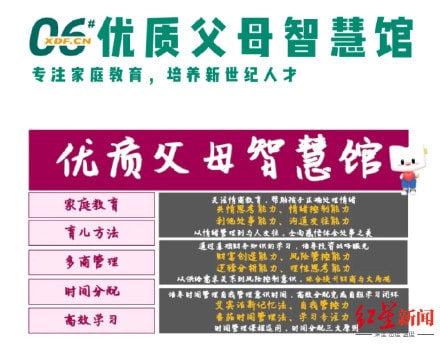
“They had to take tutoring classes when they were young, and now they have to take tutoring classes again, this generation is really suffering!”, one commenter half-jokingly said.
For now, it seems clear that the burden on students and teachers has not been alleviated by this single policy move, even though Beijing’s strike against the private tutoring industry has rattled the market. Many parents will continue to spend huge amounts on their children’s future success, no matter what the cost.
By Yunyi Wang & Manya Koetse
Follow @whatsonweibo
Featured image: MChe Lee
Spotted a mistake or want to add something? Please let us know in comments below or email us. First-time commenters, please be patient – we will have to manually approve your comment before it appears.
©2021 Whatsonweibo. All rights reserved. Do not reproduce our content without permission – you can contact us at info@whatsonweibo.com.
Stories that are authored by the What's on Weibo Team are the stories that multiple authors contributed to. Please check the names at the end of the articles to see who the authors are.

China Insight
The Tragic Story of “Fat Cat”: How a Chinese Gamer’s Suicide Went Viral
The story of ‘Fat Cat’ has become a hot topic in China, sparking widespread sympathy and discussions online.
Published
3 months agoon
May 9, 2024
The tragic story behind the recent suicide of a 21-year-old Chinese gamer nicknamed ‘Fat Cat’ has become a major topic of discussion on Chinese social media, touching upon broader societal issues from unfair gender dynamics to businesses taking advantage of grieving internet users.
The story of a 21-year-old Chinese gamer from Hunan who committed suicide has gone completely viral on Weibo and beyond this week, generating many discussions.
In late April of this year, the young man nicknamed ‘Fat Cat’ (胖猫 Pàng Māo, literally fat or chubby cat), tragically ended his life by jumping into the river near the Chongqing Yangtze River Bridge (重庆长江大桥) following a breakup with his girlfriend. By now, the incident has come to be known as the “Fat Cat Jumping Into the River Incident” (胖猫跳江事件).
News of his suicide soon made its rounds on the internet, and some bloggers started looking into what was behind the story. The man’s sister also spoke out through online channels, and numerous chat records between the young man and his girlfriend emerged online.
One aspect of his story that gained traction in early May is the revelation that the man had invested all his resources into the relationship. Allegedly, he made significant financial sacrifices, giving his girlfriend over 510,000 RMB (approximately 71,000 USD) throughout their relationship, in a time frame of two years.
When his girlfriend ended the relationship, despite all of his efforts, he was devastated and took his own life.
The story was picked up by various Chinese media outlets, and prominent social and political commentator Hu Xijin also wrote a post about Fat Cat, stating the sad story had made him tear up.
As the news spread, it sparked a multitude of hashtags on Weibo, with thousands of netizens pouring out their thoughts and emotions in response to the story.
Playing Games for Love
The main part of this story that is triggering online discussions is how ‘Fat Cat,’ a young man who possessed virtually nothing, managed to provide his girlfriend, who was six years older, with such a significant amount of money – and why he was willing to sacrifice so much in order to do so.
The young man reportedly was able to make money by playing video games, specifically by being a so-called ‘booster’ by playing with others and helping them get to a higher level in multiplayer online battle games.
According to his sister, he started working as a ‘professional’ video gamer as a means of generating money to satisfy his girlfriend, who allegedly always demanded more.
He registered a total of 36 accounts to receive orders to play online games, making 20 yuan per game (about $2.80). Because this consumed all of his time, he barely went out anymore and his social life was dead.
In order to save more money, he tried to keep his own expenses as low as possible, and would only get takeout food for himself for no more than 10 yuan ($1,4). His online avatar was an image of a cat saying “I don’t want to eat vegetables, I want to eat McDonald’s.”

The woman in question who he made so many sacrifices for is named Tan Zhu (谭竹), and she soon became the topic of public scrutiny. In one screenshot of a chat conversation between Tan and her boyfriend that leaked online, she claimed she needed money for various things. The two had agreed to get married later in this year.
Despite of this, she still broke up with him, driving him to jump off the bridge after transferring his remaining 66,000 RMB (9135 USD) to Tan Zhu.
As the story fermented online, Tan Zhu also shared her side of the story. She claimed that she had met ‘Fat Cat’ over two years ago through online gaming and had started a long distance relationship with him. They had actually only met up twice before he moved to Chongqing. She emphasized that financial gain was never a motivating factor in their relationship.
Tan additionally asserted that she had previously repaid 130,000 RMB (18,000 USD) to him and that they had reached a settlement agreement shortly before his tragic death.
Ordering Take-Out to Mourn Fat Cat
– “I hope you rest in peace.”
– “Little fat cat, I hope you’ll be less foolish in your next life.”
– “In your next life, love yourself first.”
These are just a few of the messages left by netizens on notes attached to takeout food deliveries near the Chongqing Yangtze River Bridge.

AI-generated image spread on Chinese social media in connection to the event.
As Fat Cat’s story stirred up significant online discussion, with many expressing sympathy for the young man who rarely indulged in spending on food and drinks, some internet users took the step of ordering McDonalds and other food delivery services to the bridge, where he tragically jumped from, in his honor.
This soon snowballed into more people ordering food and drinks to the bridge, resulting in a constant flow of delivery staff and a pile-up of take-out bags.

Delivery food on the bridge, photo via Weibo.
However, as the food delivery efforts picked up pace, it came to light that some of the deliveries ordered and paid for were either empty or contained something different; certain restaurants, aware of the collective effort to honor the young man, deliberately left the food boxes empty or substituted sodas or tea with tap water.

At least five restaurants were caught not delivering the actual orders. Chinese bubble tea shop ChaPanda was exposed for substituting water for milk tea in their cups. On May 3rd, ChaPanda responded that they had fired the responsible employee.
Another store, the Zhu Xiaoxiao Luosifen (朱小小螺蛳粉), responded on that they had temporarily closed the shop in question to deal with the issue. Chinese fast food chain NewYobo (牛约堡) also acknowledged that at least twenty orders they received were incomplete.
Fast food company Wallace (华莱士) responded to the controversy by stating they had dismissed the employees involved. Mixue Ice Cream & Tea (蜜雪冰城) issued an apology and temporarily closed one of their stores implicated in delivering empty orders.
In the midst of all the controversy, Fat Cat’s sister asked internet users to refrain from ordering take-out food as a means of mourning and honoring her brother.
Nevertheless, take-out food and flowers continued to accumulate near the bridge, prompting local authorities to think of ways of how to deal with this unique method of honoring the deceased gamer.
Gamer Boy Meets Girl
On Chinese social media, this story has also become a topic of debate in the context of gender dynamics and social inequality.
There are some male bloggers who are angry with Tan Zhu, suggesting her behaviour is an example of everything that’s supposedly “wrong” with Chinese women in this day and age.
Others place blame on Fat Cat for believing that he could buy love and maintain a relationship through financial means. This irked some feminist bloggers, who see it as a chauvinistic attitude towards women.
A main, recurring idea in these discussions is that young Chinese men such as Fat Cat, who are at the low end of the social ladder, are actually particularly vulnerable in a fiercely competitive society. Here, a gender imbalance and surplus of unmarried men make it easier for women to potentially exploit those desperate for companionship.
The story of Fat Cat brings back memories of ‘Mo Cha Official,’ a not-so-famous blogger who gained posthumous fame in 2021 when details of his unhappy life surfaced online.
Likewise, the tragic tale of WePhone founder Su Xiangmao (苏享茂) resurfaces. In 2017, the 37-year-old IT entrepreneur from Beijing took his own life, leaving behind a note alleging blackmail by his 29-year-old ex-wife, who demanded 10 million RMB (±1.5 million USD) (read story).
Another aspect of this viral story that is mentioned by netizens is how it gained so much attention during the Chinese May holidays, coinciding with the tragic news of the southern China highway collapse in Guangdong. That major incident resulted in the deaths of at least 48 people, and triggered questions over road safety and flawed construction designs. Some speculate that the prominence given to the Fat Cat story on trending topic lists may have been a deliberate attempt to divert attention away from this incident.
‘Fat Cat’ was cremated. His family stated their intention to take necessary legal steps to recover the money from his former girlfriend, but Tan Zhu reportedly already reached an agreement with the father and settled the case. Nevertheless, the case continues to generate discussions online, with some people wondering: “Is it over yet? Can we talk about something different now?”

Fat Cat images projected in Times Square
However, given that images of the ‘Fat Cat’ avatar have even appeared in Times Square in New York by now (Chinese internet users projected it on one of the big LED screens), it’s likely that this story will be remembered and talked about for some time to come.
UPDATE MAY 25
On May 20, local authorities issued a lengthy report to clarify the timeline of events and details surrounding the death of “Fat Cat,” which had attracted significant attention across China.
The report concluded that there was no fraud involved and that “Fat Cat” and his girlfriend were in a genuine relationship. Tan did not deceive “Fat Cat” for money; the transfers were voluntary. Furthermore, Tan returned most of the money to his parents.
The gamer’s sister is reportedly still being investigated for potentially infringing on Tan’s privacy by disclosing numerous private details to the public.
In the end, one thing is clear in this gamer’s tragic story, which is that there are no winners.
By Manya Koetse
– With contributions by Miranda Barnes and Ruixin Zhang
Independently reporting China trends for over a decade. Like what we do? Support us and get the story behind the hashtag by subscribing:
Spotted a mistake or want to add something? Please let us know in comments below or email us. First-time commenters, please be patient – we will have to manually approve your comment before it appears.
©2024 Whatsonweibo. All rights reserved. Do not reproduce our content without permission – you can contact us at info@whatsonweibo.com.
China Brands, Marketing & Consumers
A Brew of Controversy: Lu Xun and LELECHA’s ‘Smoky’ Oolong Tea
Chinese tea brand LELECHA faced backlash for using the iconic literary figure Lu Xun to promote their “Smoky Oolong” milk tea, sparking controversy over the exploitation of his legacy.
Published
3 months agoon
May 3, 2024
It seemed like such a good idea. For this year’s World Book Day, Chinese tea brand LELECHA (乐乐茶) put a spotlight on Lu Xun (鲁迅, 1881-1936), one of the most celebrated Chinese authors the 20th century and turned him into the the ‘brand ambassador’ of their special new “Smoky Oolong” (烟腔乌龙) milk tea.
LELECHA is a Chinese chain specializing in new-style tea beverages, including bubble tea and fruit tea. It debuted in Shanghai in 2016, and since then, it has expanded rapidly, opening dozens of new stores not only in Shanghai but also in other major cities across China.
Starting on April 23, not only did the LELECHA ‘Smoky Oolong” paper cups feature Lu Xun’s portrait, but also other promotional materials by LELECHA, such as menus and paper bags, accompanied by the slogan: “Old Smoky Oolong, New Youth” (“老烟腔,新青年”). The marketing campaign was a joint collaboration between LELECHA and publishing house Yilin Press.

Lu Xun featured on LELECHA products, image via Netease.
The slogan “Old Smoky Oolong, New Youth” is a play on the Chinese magazine ‘New Youth’ or ‘La Jeunesse’ (新青年), the influential literary magazine in which Lu’s famous short story, “Diary of a Madman,” was published in 1918.
The design of the tea featuring Lu Xun’s image, its colors, and painting style also pay homage to the era in which Lu Xun rose to prominence.
Lu Xun (pen name of Zhou Shuren) was a leading figure within China’s May Fourth Movement. The May Fourth Movement (1915-24) is also referred to as the Chinese Enlightenment or the Chinese Renaissance. It was the cultural revolution brought about by the political demonstrations on the fourth of May 1919 when citizens and students in Beijing paraded the streets to protest decisions made at the post-World War I Versailles Conference and called for the destruction of traditional culture[1].
In this historical context, Lu Xun emerged as a significant cultural figure, renowned for his critical and enlightened perspectives on Chinese society.
To this day, Lu Xun remains a highly respected figure. In the post-Mao era, some critics felt that Lu Xun was actually revered a bit too much, and called for efforts to ‘demystify’ him. In 1979, for example, writer Mao Dun called for a halt to the movement to turn Lu Xun into “a god-like figure”[2].
Perhaps LELECHA’s marketing team figured they could not go wrong by creating a milk tea product around China’s beloved Lu Xun. But for various reasons, the marketing campaign backfired, landing LELECHA in hot water. The topic went trending on Chinese social media, where many criticized the tea company.
Commodification of ‘Marxist’ Lu Xun
The first issue with LELECHA’s Lu Xun campaign is a legal one. It seems the tea chain used Lu Xun’s portrait without permission. Zhou Lingfei, Lu Xun’s great-grandson and president of the Lu Xun Cultural Foundation, quickly demanded an end to the unauthorized use of Lu Xun’s image on tea cups and other merchandise. He even hired a law firm to take legal action against the campaign.
Others noted that the image of Lu Xun that was used by LELECHA resembled a famous painting of Lu Xun by Yang Zhiguang (杨之光), potentially also infringing on Yang’s copyright.
But there are more reasons why people online are upset about the Lu Xun x LELECHA marketing campaign. One is how the use of the word “smoky” is seen as disrespectful towards Lu Xun. Lu Xun was known for his heavy smoking, which ultimately contributed to his early death.
It’s also ironic that Lu Xun, widely seen as a Marxist, is being used as a ‘brand ambassador’ for a commercial tea brand. This exploits Lu Xun’s image for profit, turning his legacy into a commodity with the ‘smoky oolong’ tea and related merchandise.
“Such blatant commercialization of Lu Xun, is there no bottom limit anymore?”, one Weibo user wrote. Another person commented: “If Lu Xun were still alive and knew he had become a tool for capitalists to make money, he’d probably scold you in an article. ”
On April 29, LELECHA finally issued an apology to Lu Xun’s relatives and the Lu Xun Cultural Foundation for neglecting the legal aspects of their marketing campaign. They claimed it was meant to promote reading among China’s youth. All Lu Xun materials have now been removed from LELECHA’s stores.

Statement by LELECHA.
On Chinese social media, where the hot tea became a hot potato, opinions on the issue are divided. While many netizens think it is unacceptable to infringe on Lu Xun’s portrait rights like that, there are others who appreciate the merchandise.
The LELECHA controversy is similar to another issue that went trending in late 2023, when the well-known Chinese tea chain HeyTea (喜茶) collaborated with the Jingdezhen Ceramics Museum to release a special ‘Buddha’s Happiness’ (佛喜) latte tea series adorned with Buddha images on the cups, along with other merchandise such as stickers and magnets. The series featured three customized “Buddha’s Happiness” cups modeled on the “Speechless Bodhisattva” (无语菩萨), which soon became popular among netizens.

The HeyTea Buddha latte series, including merchandise, was pulled from shelves just three days after its launch.
However, the ‘Buddha’s Happiness’ success came to an abrupt halt when the Ethnic and Religious Affairs Bureau of Shenzhen intervened, citing regulations that prohibit commercial promotion of religion. HeyTea wasted no time challenging the objections made by the Bureau and promptly removed the tea series and all related merchandise from its stores, just three days after its initial launch.
Following the Happy Buddha and Lu Xun milk tea controversies, Chinese tea brands are bound to be more careful in the future when it comes to their collaborative marketing campaigns and whether or not they’re crossing any boundaries.
Some people couldn’t care less if they don’t launch another campaign at all. One Weibo user wrote: “Every day there’s a new collaboration here, another one there, but I’d just prefer a simple cup of tea.”
By Manya Koetse
[1]Schoppa, Keith. 2000. The Columbia Guide to Modern Chinese History. New York: Columbia UP, 159.
[2]Zhong, Xueping. 2010. “Who Is Afraid Of Lu Xun? The Politics Of ‘Debates About Lu Xun’ (鲁迅论争lu Xun Lun Zheng) And The Question Of His Legacy In Post-Revolution China.” In Culture and Social Transformations in Reform Era China, 257–284, 262.
Independently reporting China trends for over a decade. Like what we do? Support us and get the story behind the hashtag by subscribing:
Spotted a mistake or want to add something? Please let us know in comments below or email us. First-time commenters, please be patient – we will have to manually approve your comment before it appears.
©2024 Whatsonweibo. All rights reserved. Do not reproduce our content without permission – you can contact us at info@whatsonweibo.com.
Subscribe

Weibo Watch: The Future is Here

“Bye Bye Biden”: Biden’s Many Nicknames in Chinese

Enjoying the ‘Sea’ in Beijing’s Ditan Park

A Triumph for “Comrade Trump”: Chinese Social Media Reactions to Trump Rally Shooting

Weibo Watch: Get Up, Stand Up

The Tragic Story of “Fat Cat”: How a Chinese Gamer’s Suicide Went Viral

“Old Bull Eating Young Grass”: 86-Year-Old Chinese Painter Fan Zeng Marries 36-Year-Old Xu Meng

A Brew of Controversy: Lu Xun and LELECHA’s ‘Smoky’ Oolong Tea

Singing Competition or Patriotic Fight? Hunan TV’s ‘Singer 2024’ Stirs Nationalistic Sentiments

Zara Dress Goes Viral in China for Resemblance to Haidilao Apron

Weibo Watch: The Battle for the Bottom Bed

About the “AI Chatbot Based on Xi Jinping” Story

China’s Intensified Social Media Propaganda: “Taiwan Must Return to Motherland”

Weibo Watch: Telling China’s Stories Wrong

Saying Goodbye to “Uncle Wang”: Wang Wenbin Becomes Chinese Ambassador to Cambodia
Get in touch
Would you like to become a contributor, or do you have any tips or suggestions? Get in touch here!
Popular Reads
-

 China Insight3 months ago
China Insight3 months agoThe Tragic Story of “Fat Cat”: How a Chinese Gamer’s Suicide Went Viral
-

 China Music4 months ago
China Music4 months agoThe Chinese Viral TikTok Song Explained (No, It’s Not About Samsung)
-

 China Digital10 months ago
China Digital10 months agoToo Sexy for Weibo? Online Discussions on the Concept of ‘Cābiān’
-

 China Arts & Entertainment12 months ago
China Arts & Entertainment12 months agoBehind 8 Billion Streams: Who is Dao Lang Cursing in the Chinese Hit Song ‘Luocha Kingdom’?






